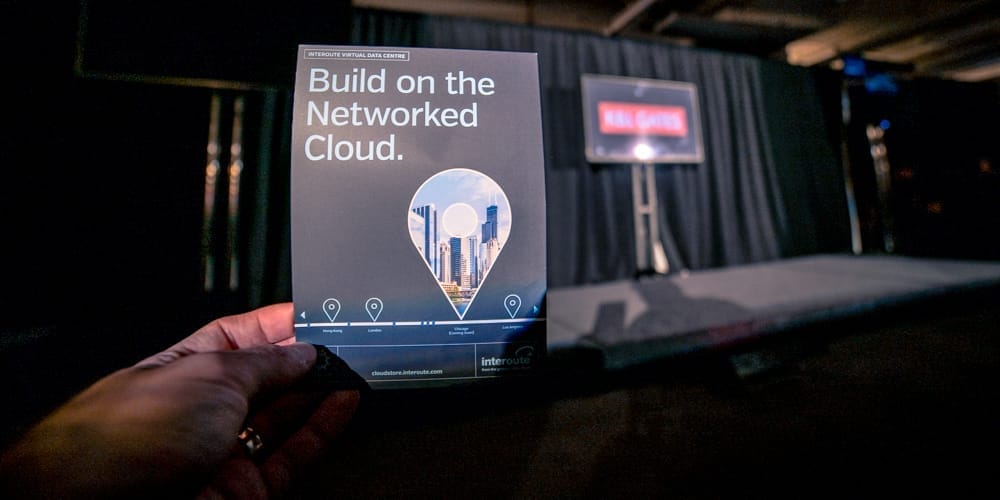Techweek 2015 in Chicago is a great place for people interested in Technology to meet and listen to talks by a number of experts in a wide range of fields. One of the parts of the industry that has been generating a lot of buzz over the last few years, is that of "the Cloud," which as we learned last year is really more of an idea than a true product. With businesses all over the world leaving the on-premise technology for the Cloud, the topic was one that we were keen to listen about and discuss!
Note: Most of these are taken as direct notes/summaries of what was said and asked during the panel.
"Making the Public Cloud your Private Cloud" - Naser Ali
The first talk we went to was by Naser Ali from Interoute, where he discussed "Making the Public Cloud your Private Cloud." A bit of background on Interoute, they deal with about 40% of Europe's traffic, with over 1400 employees, 31 colocation centers, 12 data centers, and 14 virtual data centers (VDC) around the world. Needless to say, they're a cloud expert that is quickly expanding.
Interoute provides a global network of complete resources, for free, meaning that if you use their services you won't pay extra for housing your data overseas and they'll provide background support for no extra cost. They've spent billions on putting networking infrastructure all over the world and continue to expand into more regions of the world.
Interoute VDC comes with its own free global connectivity, seamlessly integrated with free 1Gb/s interconnects. The reason that this is superior versus something like Amazon Web Services is that with AWS you are still utilizing public routing, meaning that there's always a chance for diminished security.
Naser explained the various types of cloud designs, from full cloud to hybrid cloud, explaining that the Cloud is public by default—meaning that it's not always the most secure. In most cases, the Cloud is configured in a "dumb network," meaning that you can't fully optimize the connections. For real optimization and security, Naser explained that using MPLS networks is the best way to go due to the connections not touching the private sphere. MPLS networks are designed to connect multiple sites together directly in the same way as a T1 connection but with added features and security.
Here's the main point of Naser's talk, because the majority of high-end cloud computing companies are going to have many of the same abilities and features, you want to put your company's technological assets in a cloud computing network that really has a high focus infrastructure. If you want to utilize the public Cloud, it's recommended that you look for a company (such as Interoute) that gives you a service that has privacy and compliancy by default. By bringing all of your data and infrastructure to one platform, and not splitting it, you're looking at the highest in security.
Take a look at the post-talk interview we did with Naser below:
https://www.youtube.com/watch?v=KHLrFxvKw1k
"Why Public Clouds are a step backward in Efficiency" - Jordan Jacobs
Jordan Jacobs gave the second talk about the Public Cloud we attended.
Jordan opened up with the relationship between the application and the server, pointing out that every year server applications are using fewer resources, BUT people continue to buy more resources than they need, which kills your efficiency and budget. In many cases, this is because companies use a single server for each application, mainly because of how things worked pre-virtualization. Virtualization made efficiency much easier—until the Public Cloud.
Due to the ease of use of the Public Cloud in terms of spinning up a new server, we've gone back to the Allocation model. Instead of focusing on the reservation model, in which you focus on cost due to resources, we've gone back to spinning up a server for each application. The real problem with this isn't that the price of services has gone down, but that the pricing model is becoming more profitable for allocation based models. Essentially if capacity is increasing every 18 months, the price should be reducing every 18 months as well.
Where does a Public Cloud make sense? Due to the value of the Public Cloud being tied to services, such as analytics, the Public Cloud should be used when you're looking for services—not infrastructure/reservation. The solution to this is a hybrid model, because you can't realistically do only one when you have a number of different services and applications.
There are two options when it comes to your own private cloud – Hosted (1-3 year lifespan) or On-Premise (3 year lifespan). When it comes to the hosted cloud, it's important to ensure that the company you go with gives you the same ability to manage your services as an on-premise service. Company doesn't matter, services and features do.
We caught up with Jordan after his talk and discussed the Cloud, SingleHop, and hosting video games! Check out the video below:
https://www.youtube.com/watch?v=s-NrNPO_KU8
"Security in the Cloud: Keeping Your Business Grounded" - Karl Zimmerman
The final cloud talk we visited was on Security in the cloud, which happened to be a panel of experts from a few different companies specializing in Cloud computing and security.
The first piece of information the panel gave was about what to look for when you are considering getting a Cloud solution or moving your infrastructure to the Cloud. The consensus is that you should know what you want before you make the decision, and then narrow down your Cloud provider from there. That way, you'll get all the features you want, and save a lot of time going back and forth with each cloud provider as you try to figure out if each one has what you want.
The biggest hindrance when it comes to security in the Public Cloud is trust. You have to be able to trust your vendor, and the reason that security is tough in a public standpoint is because it's not fully in your hands as opposed to a private hosting. But even though this is always a possibility (losing control), you can still utilize tools to ensure that your security is enhanced, so that you can focus on other things than managing the solutions.
The good service providers in the market are those that focus on single tenant networks and have a focus on security. If you're working with multi-tenant cloud providers, they are wearing so many hats that security always has a possibility to fall behind. It's once again about trust; find a company that you trust to handle your cloud. Even if you don't have the reins of everything, find a service provider who you can trust to handle all aspects of your technology.
"Do you see Cloud security solutions replacing physical security solutions?"
Handled by Juniper - The short story on this question was "no, if anything, you'll use the Cloud security solutions to enhance your physical security solutions." You're still going to keep the physical firewalls, but you can utilize the high-tech virtual firewalls for your applications. This will double your security and enable you to have to manage less rules. Having both is advantageous due to the virtual firewall being more of a detector than a mitigator due to chip limitations, which allows the virtual firewall to detect and the physical firewall to mitigate.
"Is the idea of perimeter security dead?"
The idea of permeter security has changed thanks to BYOD, but the actual practice of it is still valid. Bring Your Own Device creates a new complexity in that employees have outside access to the network via their own personal devices. While this creates new complexities, there are still great tools to monitor what is being done on the work network.
"Do you recommend redundant cloud providers?"
In most cases, you could do redundant cloud providers, but there are very few companies that use redundant cloud vendors. However, some cloud providers will partner with another provider to ensure that services stay up should they/you get DDoS'ed.
"What is the #1 things that most startups aren't doing from a security standpoint?"
First, know the flow of data and where the data is kept and stored. If you don't know where the sensitive data is flowing, it can create issues for both you and your customers. Second would be to educate your users to protect their devices so that the company network can't be accessed easily. Third, would be to NEVER use the same passwords for your infrastructure—always have different passwords for different services to ensure not everything can be breached.
We met up with Karl Zimmerman the day after the panel, to talk about the Cloud and Security, check out the video below:
https://www.youtube.com/watch?v=C26SxM452do
Techweek is an incredible place for people involved all over the Tech Industry both in and out of Chicago to come together and learn more about a wide variety of topics. With Cloud computing becoming so prevalent in the industry, and in a lot of ways moving to becoming something of a standard, it's always an absolute pleasure to listen to and interview experts in the field.
Hopefully you learned something from this, because we have a much greater understanding of Cloud computing thanks to the incredible talks (and interviews!) at Techweek Chicago 2015!







